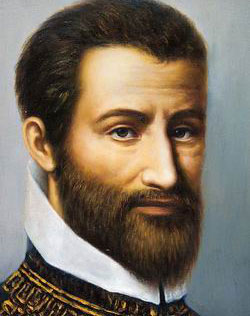 PALESTRINA
PALESTRINA(excerpts from the book, Bach, Beethoven and the Boys by David Barber)
Palestrina went into partnership with the shop's young apprentice and together they made a killing on the market. Palestrina's wife was no fool, either. She invested 500 scudi into the business, which she later withdrew and lent back to Palestrina at eight-per-cent interest. He owned four houses, which he rented out to quiet tenants.
Palestrina was very busy. In the mornings he minded the fur store and unplugged his tenants' toilets; in the afternoons he composed motets and masses. Somehow he found time to write 93 Masses and 500 Motets, not to mention the four books of madrigals and other assorted church music.
But this is nothing compared to the vast number of works -- nearly 2000 -- composed by Palestrina's contemporary, Orlando di Lasso. He was born in Belgium in 1530 or so and had such a fine voice as a boy that he was kidnapped three times by rival choirs.
Lasso did very well for himself, always managing to get hired by rich patrons who let him travel all over Europe in grand style. Once when the church authorities organized a solemn procession through the streets of Munich the parade was nearly ruined when it looked like it was going to rain. As soon as the choir began to sing a piece of his music, the clouds parted and the sun shone. Thereafter, the same piece was sung at all processions, just to be on the safe side.
Lasso enjoyed tremendous popularity as a composer and had his music performed in all the best places. Although he was quite wild as a young man, he got more serious as he grew older. Towards the end he went bonkers. He no longer recognized his wife and started to mumble.
For all-round piety it's hard to beat Tomas Luis de Victoria, who was a Spanish composer of the same period. He was also a priest. He kept saying that he was going to give up composing and devote himself to the contemplation of higher things. But somehow he never quite got around to it.
Victoria studied in Rome before returning to Spain and admired Palestrina so much that he even took to copying his style of clothing and the way he trimmed his beard.
Victoria wasn't the only one who admired Palestrina, who even in his own time was better respected than most musicians ever manage today. Just two years before Palestrina's death, a group of composers got together and printed some music, which they dedicated to Palestrina, whom they called: "an ocean of musical knowledge." They said that compared to him they were merely, "rivers whose life is bound up with the sea." Palestrina was flattered, but had to ask them to stop before his feet got too wet.
Palestrina died in 1594 and was buried in the St. Peter's cemetery. Over the years, what with all the renovations and everything, we seem to have misplaced his grave. But he's still there somewhere, decomposing.
4 comments:
Haha, decomposing, I get it . . . I still like Palestrina, though. Why shouldn't I? Maybe he was a tad worldly, but we can't all be Victoria. Besides, if he was Victoria his music would have been that much more difficult; I like people for utilitarian reasons.
Actually, I was curious to see what your reaction would be to him remarrying within a year of his first wife's death - and the reaction of the other women who read this blog.
I figured that was what you were referring to. Interesting question, but I have to say that in this case, I really didn't bat an eye over the timing of his remarriage. Knowing relatively nothing about the people involved, it's difficult to know what their relationships really were - was his first marriage one of love, or for more material considerations? (It was mentioned his first wife had just come into some property when he married her). Could be there was a pattern there - both marriages seemed to afford him some material advantage. And really, for this time period, that's not such a shocking thing. We must remember that marriage for love is a relatively modern concept - for much of history marriages had more to do with business matters and financial practicalities - not that affection didn't develop later in many cases - but those were the facts. If this were set in modern times, I might be inclined to be a bit harder on him, but given the attitudes toward marriage at that time, I tend to cut him some slack. And, even from a modern perspective, it sometimes seems that men who have been married for awhile are much more vulnerable and lonely after being widowed than their female counterparts - and sometimes talk themselves into a quick second marriage because they can't stand being alone. Sometimes it turns out well, sometimes not.
Good to see you back, Anne. Interesting comments.
Post a Comment